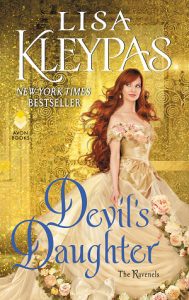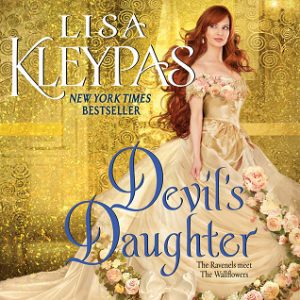I listened to Devil’s Daughter by Lisa Kleypas recently and I loved it so much I decided to read the book as well. If anyone has been following my Twitter feed at all, it won’t be a surprise that I have fallen hard for West Ravenel, the hero of Devil’s Daughter. I’m not alone. Janine from Dear Author is similarly obsessed – I believe she’s re-read the book three times now. Her review of the book is here and my review of the audiobook is at AudioGals here. Janine and I also had an epic email thread going where we gushed and squeed and reveled in the West Ravenel goodness so it’s clearly a book which has captured our imaginations.
As much as I enjoyed the audiobook, reading the print/digital version is a different experience again. Things I’d forgotten or somehow glossed over come into sharper focus in print for me. Whereas on audio I feel better able to understand certain subtext (I believe this is because the narrator does some of that interpretation for me and thank god for it I say – it’s not something I’m really good at. Or, maybe hearing the words produces a more instinctive emotional response than seeing the words? Or if not more instinctive, different? Who knows?). In any event, the other night when I was reading, a particular line stood out to me and it was kind of a revelation.
By way of background, West Ravenel is a former bully (he refers to himself as being a “brute” back then) and he grew into a womanising heavy-drinker (who may or may not have been a kind of alcoholic) – unhealthy in the various ways one can be unhealthy, causing scandals and strife and embarrassment, ruining marriages and generally being scandalous and terrible. At the start of the Ravenel series, his elder brother Devon unexpectedly inherits an rundown earldom and despite West’s advice, decides to take it on and try and look after the people and get the estate solvent and even profitable. And, even though West thinks it’s madness, he helps. At Eversby Priory there is much to do and West becomes the de facto estate manager. There’s no time for drinking and carousing and West pulls himself out of the ditch and becomes a better man. One of the (many) reasons I adore West is that he does this for himself, not because of a woman as is so often the case in romance (*coughSebastianChalloncough*). By the time he meets Phoebe, Lady Clare (eldest daughter of Sebastian as it happens) he is a changed man. He doesn’t drink to excess, he works hard, he is healthy and well. He has made himself into a man to be proud of, albeit that he feels his past makes him unworthy.
Phoebe is a widow and her husband, Henry, was a couple of years behind West at boarding school. That’s when West was a “brute”. He bullied Henry, who was “sickly” and “sensitive”. While the bullying wasn’t violent – no blood was shed, it was mean and the book makes no excuses for the behaviour. Phoebe in fact notes that the kind of bullying Henry was subjected to can be just as damaging. While West had his reasons for his behaviour, they did not excuse his actions.
One of his last acts of bullying was to take a book from Henry. It was Henry’s favourite book. At first West was going to taunt him with it and embarrass him by reading passages aloud in front of others but he started to read it and then he was hooked. This stolen book was his first book and it became his favourite too. While he intended to return the book to Henry, he had not done so by the time Henry was removed from the school by his parents.
When West is conversing with Phoebe that first night at dinner, he realises that the Henry he bullied at school is the same man to whom Phoebe was married and the book Phoebe referenced as inspiring the name of their second son is the same book West had stolen. Which leads to this, shortly after:
“What I’d like more than anything,” he said quietly, “is for you to listen to an apology.”
“You have nothing to apologize for.”
“I’m afraid I do.” He let out a measured breath. “But first, I have something to give you.”
He went to a cabinet in a corner of the room and rummaged through its contents. Finding the object he sought . . . a small book . . . he brought it to her.
Phoebe blinked in wonder as she read the gold and black lettering on the battered cloth cover. The title was worn and faded, but still legible.
STEPHEN ARMSTRONG: TREASURE HUNTER
The line that struck me last night when I was reading was this one: “What I’d like more than anything,” he said quietly, “is for you to listen to an apology.” And this is reason number 642 why I love West Ravenel. He doesn’t ask for forgiveness. He doesn’t expect forgiveness. What he wants, more than anything, is just to apologise. For Phoebe to listen to him do so. Her response to it is another matter entirely. He doesn’t even expect she will listen. His request of her is that she does. He doesn’t even go so far as to force an apology on her. How refreshing. How appreciated.
Later in the passage he actually does apologise – simply and without making excuses:
“Don’t waste forgiveness on me. I’m a lost cause. Believe me, compared to my other sins, this was a drop in the bucket. Just take the book and know that I’m sorry.”
It is notable he expects nothing more from her. She offers forgiveness but his apology isn’t about seeking forgiveness or redemption. He apologises because it is the right thing to do. Because he is remorseful and regretful. Because he is a better man now. I talked about forgiveness a little in my review of Mrs. Drew Plays Her Hand (see the spoiler tag and the comments) and West’s actions here are an interesting and welcome contrast.
A hero who can apologise unreservedly and expecting nothing in return is something special and frankly, there aren’t enough of them in Romancelandia.
Just another reason I love West – who is, I remind you, ALL THE THINGS.
BUY IT:
AMAZON KOBO BOOK DEPOSITORY










I loved that scene so much! His apology was so sincere, selfless and heartfelt.
I loved how Phoebe realized the book had meant just as much or more to him than it did to her and to Harry, too. And there was this wistful if only in there, if only he had told Harry how he felt about it. You could see the seeds of the person he would eventually become in the child West’s desire to be brave enough to do that.
And I loved the bit with the X’s and the way it carried over to the agricultural book he gave her.
There is so much to love about this book. It is just so romantic.
Oops, Henry not Harry.
He stacks up so well against multitudes of heroes. How many times have we read “You have to forgive me!” I just loved his humility which never became annoying martyrdom (well, not until right at the end and that’s when Sebastian stepped in and sorted him right out!).
I, too, had the sense that Henry and West would have been friends if only they’d had an actual conversation about that book.
Yeah. Thinking on this further, I think his humible demeanor and self-deprecation are a big part of what I love about htim. There is a line where Devon says to West that he was a rake and West says, “You were a rake, I was a wreck.” He has no illusions about himself, and there’s something so attractive about that.
Yes. He doesn’t laugh about it or remember it fondly like Sebastian does (or like just about every other romance rake does). He genuinely regrets. Given current sensibilities that sits far better with me.
To be fair many romance rakes were written in different times but a rake storyline written now is something I look at with a different eye.